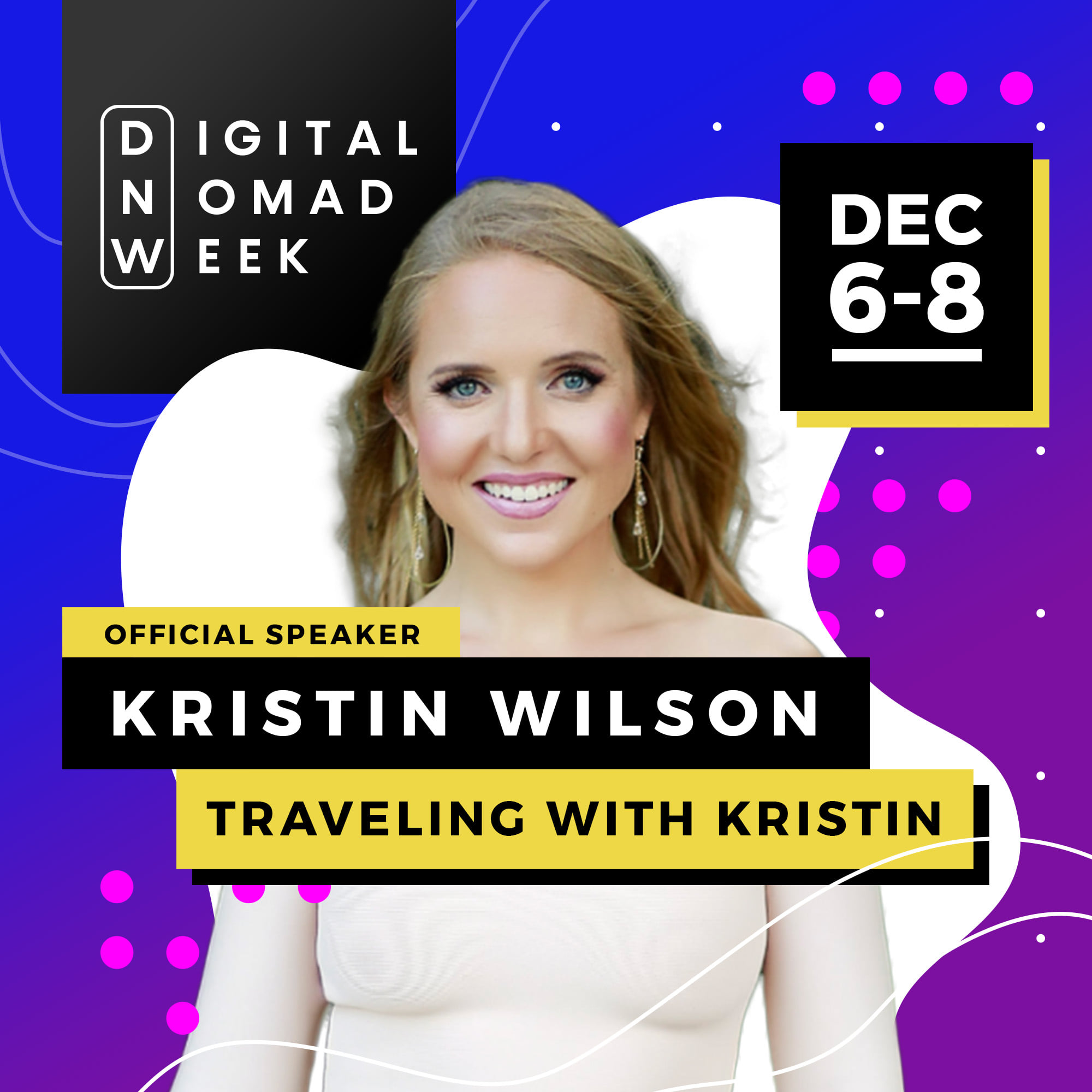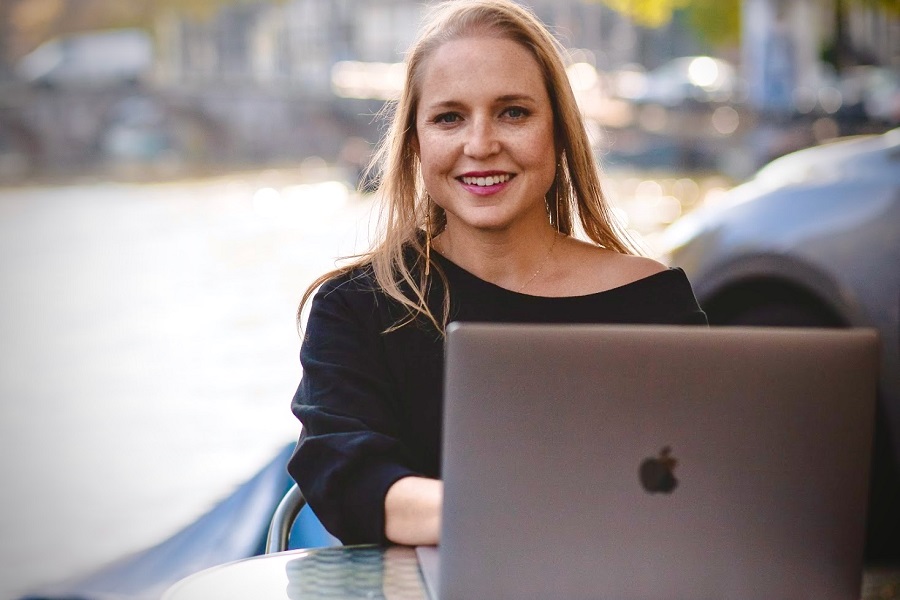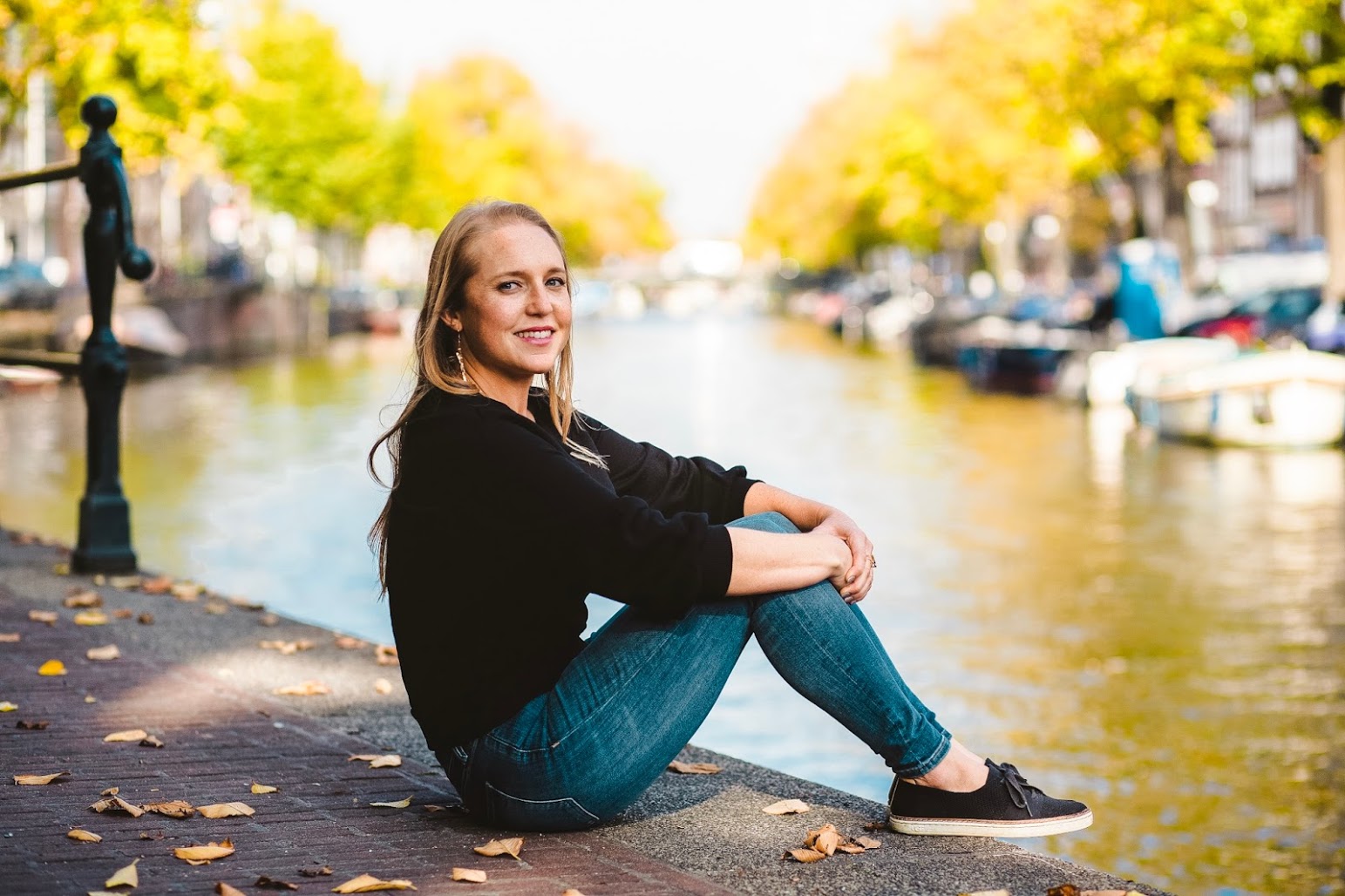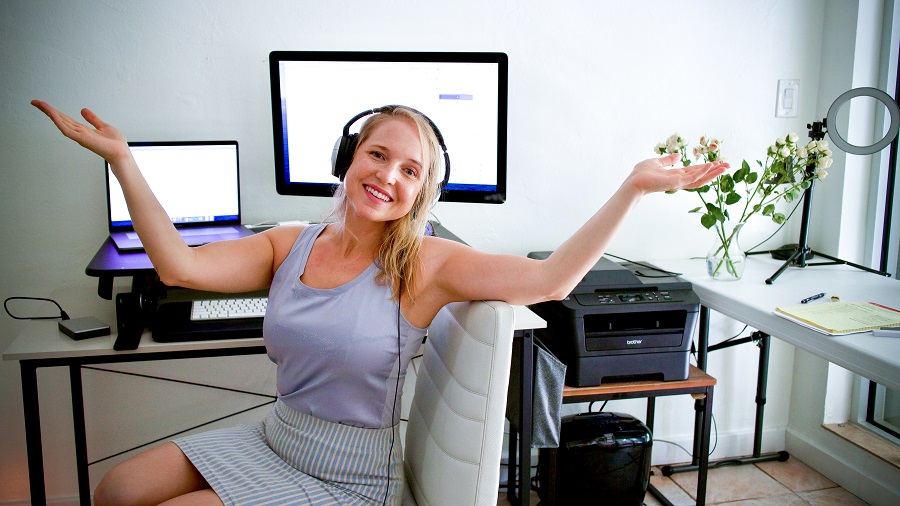November 10, 2021 - Less than a month until Digital Nomad Week, the virtual edition with 10,000 nomads expected to attend, and more than 100 speakers including TCN. Continuing our look at the keynote speakers, meet one of the most experienced nomads on out there, Kristin Wilson of Traveling with Kristin.
Kristin Wilson is a long-term digital nomad and relocation expert who has been traveling the world for 20 years and helping others do the same since 2005. Today, she's also known as YouTube's Traveling with Kristin and is the host of the top-rated Badass Digital Nomads podcast, with listeners in 156 countries. Kristin is a Top Writer on Medium and Quora in topics such as Business, Life, Travel, Technology, Productivity, and Digital Nomads. She has been featured on The Today Show, HGTV's House Hunters International, Bloomberg Businessweek, The New York Times, Wall Street Journal, Huffington Post, and more. When she's not traipsing the globe or helping people move overseas, you can find her behind the DJ decks.

1. You are a keynote speaker at Digital Nomad Week in December. Tell us a little about DNW, why you decided to get involved, and what you will be talking about.
Digital Nomad Week is an online summit bringing together thousands of people from around the world to learn more about how to work remotely and travel full-time. It was founded by Olumide Gbenro, who is a highly active creator and maker in the digital nomad community.
I decided to get involved with DNW for the same reasons that I decided to start speaking publicly about the location-independent lifestyle to begin with - to share it with others and help people learn from my experiences.
When I started Traveling with Kristin in 2018, there were many misconceptions about remote work. Most companies were too resistant to change and said it wouldn’t work for them. And the digital nomad lifestyle certainly wasn’t taken seriously by the mainstream (Tim Ferriss’ The 4-Hour Work Week book being an exception).
But after living as some form of an expat or digital nomad for 15 years and running a fully-remote, global relocation company for nearly 10 years, I knew what was possible because I’d lived it and helped 1,000 of my clients do the same.
I wanted to share with the masses how they could break free from the conventional, 9-5 rat race and live life on their own terms. And I wanted to portray how attainable this lifestyle really was, and that it wasn’t “too good to be true.” I also wanted to share my mistakes, lessons I’d learned along the way, and things I wish I knew when I started out living abroad.
So, I started getting as involved as I could in the digital nomad community, speaking and hosting workshops on the Nomad Cruise and at the Nomad Summit. I launched two YouTube channels, a digital nomad news show and podcast, and began blogging about every topic or FAQ I could answer. I also started an interview-style podcast, Badass Digital Nomads, in order to host fellow nomads and share their stories of how they transitioned into a freedom lifestyle.
At first, I saw myself as a remote work advocate of sorts, writing about the benefits of remote and work-from-home //medium.com/@kristinmwilson">on Medium and talking about it on my podcasts. But once the pandemic hit, I felt my work there was done. People and companies didn’t need convincing anymore because they saw and experienced the reality for themselves.
Since then, I’ve felt it was more important to serve individual people in helping them transition to location independence and continue spreading the word about the reality of the lifestyle by collaborating with other people in the community. That’s why I wanted to be a part of Digital Nomad Week - it’s full of very experienced speakers who want to help others and grow the movement.

2. How does DNW rate on the nomad conference/festival calendar in your opinion in terms of size/importance?
It’s funny you ask, because before the pandemic started, my team and I spent hours looking up every digital nomad event on the internet and adding it to a free shared Google Calendar. Unfortunately, the lockdowns started a few days later. Most events have since transformed into online summits, and it seems that DNW is gearing up to be one of the biggest in its first year. However, I’m hoping that we’ll have many more in-person events to attend in 2022 and beyond.

3. You have been a digital nomad for over 15 years now. What was it like being a nomad back then compared to now?
There are many more benefits for new digital nomads of today. First and foremost, because of the advances in technology. I can remember when the first iPhone came out in 2007-2008 while I was living in Nicaragua. I was ecstatic because I realized I didn’t have to get so lost anymore while driving through Central America (although the maps features didn’t work so well back then). It’s mind-boggling how many more tools and apps we have at our disposal today compared to 15-20 years ago.
When I first moved to Costa Rica in 2002, I had to use paper scratch-off calling cards at public pay phones to call home and internet cafés to check email. There was no remote learning when I lived in Australia in 2003, for example. And when I moved back to Costa Rica full-time in 2005, we had a 128kbps satellite internet connection at our office that barely loaded Skype. I didn’t have internet at my house until 2010 (just imagine). I feel like I missed an entire decade of pop culture and viral YouTube videos while I was living in the jungle (lol). Technology has really made anything possible these days. But it’s not just FaceTime, social media, and Zoom - it’s many of the products, apps, and services that digital nomads have created to serve our own needs, from co-living houses to retreat groups to sites like NomadList - it’s been amazing to see thousands of digital nomads inventing the things they want to have in the world.
The other huge benefit now is the community aspect. In the “old days,” there was no terminology to describe the lifestyle we were living. There were probably hundreds of thousands of digital nomads who didn’t know what we were and didn’t have any association or connection with each other. Today, we have plenty of in-person and online events, Facebook groups, Slack and Discord channels, private members communities and more for support.
Another massive shift has been in the fintech industry. Before Bitcoin and money transfer services like Wise (TransferWise) were invented, banking options were so limited, restricted, and expensive. It could take weeks or months to open a bank account abroad and then doing business was a nightmare with wire transfers and paperwork.
We also have the digital nomad visas now, of course, which was unheard of before the pandemic. Things are only going to get better for nomads in the future in my opinion. Whereas before, each of us likely felt quite isolated from the mainstream, now we are accepted as a group, we are part of a really cool community of like-minded people, and we have more strength in numbers.
I could go on, but basically everything that was hard before is easier and more convenient today. Even housing - it was so hard to find short-term, furnished monthly rentals before. Now we have Airbnb and thousands of competitor sites.
All of this adds up to a better quality of life for everyone with less time spent on logistics and planning and more time spent on connections and experiences.

4. The pandemic put an increased focus on the potential of remote work, but the trend has been building for some time. Where do you think all this will be in 5 years?
Remote work/work-from-home/telecommuting has been possible for at least 50 years. The only hurdles to mass-adoption were psychological. In that sense, I think that the final barriers to remote work have finally fallen. I wrote an article on Medium in 2019 about “12 Ways the World Will Change When Everyone Works Remotely.” We are already seeing a lot of that but we’ll continue to see the world get smaller. Borders will open up more, travel will become more affordable, and companies will pretty much abandon their hopes for hybrid work. As soon as commercial leases run out, they won’t be renewed unless it’s for flexible workspaces.
Like the venture capitalist, Naval, has talked about on his podcast, more people will become self-employed. Creative, knowledge work will become more valuable as more jobs are automated. We are well on our way to being autonomous, financially independent individuals in a collaborative, global community. We will likely have a global passport, global remote work permit, and global tax system as well.
I made a video explaining what’s behind The Great Resignation recently, as well - see below.
5. I would like to ask you about Croatia, as that is my primary focus. You did a piece on the Croatian DN permit a year ago. How long has Croatia been on the nomad radar, and do you think the perception of and interest in Croatia has changed in the last 12 months. And if yes, in what way?
Croatia really came under the digital nomad radar thanks to the digital nomad visa and a more flexible international travel policy during the pandemic. It has also come onto the digital nomad map by intentional, targeted efforts by Croatia-based nomads to create buzz about it, communicate the benefits for remote workers, and build a community there. Although I traveled to Croatia for fun (and worked remotely there) in 2017, I didn’t hear much about it as a digital nomad destination or meet any fellow nomads there prior to the pandemic.
But it makes sense that so many people are flocking to Croatia now, because of all the attributes the country has to offer. It’s friendly, safe, has a low to moderate cost of living, good weather, fun things to do, food, history, culture, and has a central location between Europe/Africa and the Middle East. The infrastructure and connectivity is also good there, and it’s a bonus for some international citizens that Croatia is still outside of the Schengen Zone, which allows them to stay in the region longer without a visa or permit.
But I think the primary reason that people are attracted to Croatia is because of the efforts by the government and digital nomad association to provide support to new arrivals and make them feel at home. Community is more important than a list of amenities or a pros and cons list, in my opinion.

6. Tell us about your DN experience in Croatia. What was good, and what does Croatia need to focus on to improve?
I spent most of my digital nomad experience in Croatia on a sailboat, so it was an amazing experience sailing the coast and traveling to so many different islands, historical sites, and coastal towns. On the downside, I remember the internet was spotty and I kept running out of data on my sim cards. It was probably for the best as I ended up having more fun and working less, but I would imagine that connectivity has improved drastically in the past 4-5 years.
Editor's note - things HAVE improved a lot in the last few years. Check out last summer's Digital Nomad Sailing Week with 45 Degrees Sailing above.
I wasn’t aware of any digital nomad infrastructure or support system when I was there, or I would’ve used it. So I felt like I was fending for myself at that time and winging it, as other travelers can relate to. I flew over from Italy and left by car and bus on a road trip through the Balkans, so it was an adventure.
I have managed a lot of relocations for clients moving to Croatia, and one of the biggest challenges has been finding affordable long-term housing. Croatia’s economy is very tourism-centric and there is a lot of luxury tourism, so it would be helpful for nomads to have assistance in finding affordable housing year-round.

7. You are installed as the Croatian Minister of Tourism. What are the next steps you would implement to develop Croatia's DN strategy?
I would make the digital nomad visa more flexible and easy to apply for, especially considering that every country in the world will soon have some form of a digital nomad visa.
I think that overall, countries are being too conservative with their digital nomad visa options and not providing enough value or services with it. Governments should make it as easy as possible for remote workers to apply for a long-stay visa in their countries, where they will boost the economy and add to the diversity of the population without taking away local jobs. Give nomads access to the same services as long-term residents and work-permit holders, whether that’s banking, healthcare, etc. Nomads can provide a new kind of stability for the economy, filling a gap between locals and tourists. But there are still many people around the world who don’t understand that they would qualify for a digital nomad or remote work visa, so money should be invested into educating the market.
As Minister of Tourism, I would also look into providing remote work incentives to international citizens, similar to the state and local government initiatives across the US. With all the funds that go into incentivizing companies to create jobs in certain areas, those funds can be re-routed to incentivize individual freelancers, entrepreneurs, and remote employees.
Tourism Boards should also redirect a portion of funds that would traditionally go towards travel agencies, cruise ships, airlines, lobbying groups, and other travel providers and invest instead in learning about and promoting remote work initiatives.
Ideas for how these funds could best be used would come ideally from within the digital nomad/remote work community itself. I would put together focus groups or a task force made up of remote founders/ceos, online entrepreneurs, influencers, co-working/co-living operators, retreat and events organizers, and community leaders to brainstorm and collaborate.
Also, I would share about new initiatives more on social media! (Government websites are notoriously hard to navigate.) But Croatia has been doing a better job than most countries on this, especially buoyed by local news media and DN organizations.
In sum, for countries to thrive in the remote economy, their political leaders must think differently than ever before. This is uncharted territory, but it’s an exciting time in human history. Croatia can help lead the way for other countries to follow.

You can follow Kristin Wilson on her official website, and I also recommend you check out her YouTube channel.
To get your ticket for Digital Nomad Week, check out the event website.
For more news and features about digital nomads in Croatia, follow the dedicated TCN section.


